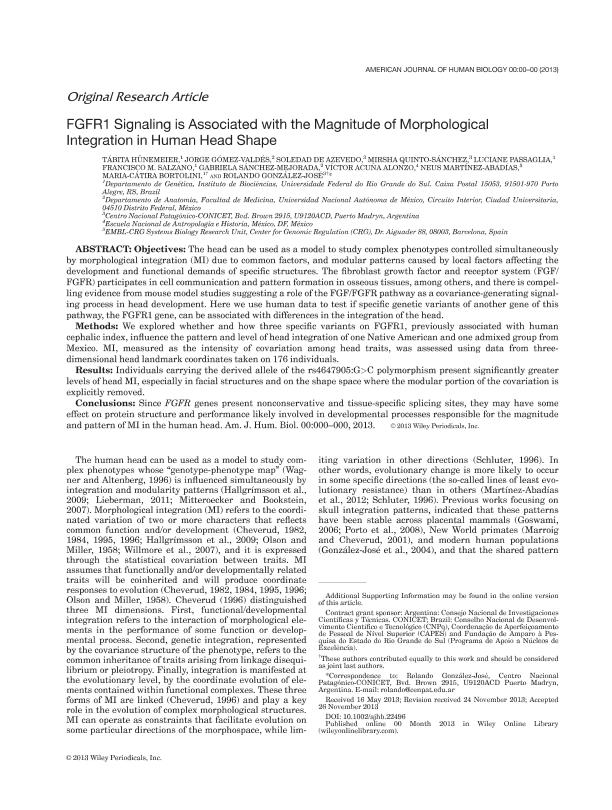Artículo
FGFR1 signaling is associated with the magnitude of morphological integration in human head shape
Hünemeier, Tabita; Gómez Valdés, Jorge; de Azevedo, Soledad ; Quinto Sanchez, Mirsha Emmanuel
; Quinto Sanchez, Mirsha Emmanuel ; Passaglia, Luciane; Salzano, Francisco M.; Sánchez Mejorada, Gabriela; Acuña Alonzo, Victor; Martínez Abadías, Neus; Bortolini, Maria Catira; Gonzalez José, Rolando
; Passaglia, Luciane; Salzano, Francisco M.; Sánchez Mejorada, Gabriela; Acuña Alonzo, Victor; Martínez Abadías, Neus; Bortolini, Maria Catira; Gonzalez José, Rolando
 ; Quinto Sanchez, Mirsha Emmanuel
; Quinto Sanchez, Mirsha Emmanuel ; Passaglia, Luciane; Salzano, Francisco M.; Sánchez Mejorada, Gabriela; Acuña Alonzo, Victor; Martínez Abadías, Neus; Bortolini, Maria Catira; Gonzalez José, Rolando
; Passaglia, Luciane; Salzano, Francisco M.; Sánchez Mejorada, Gabriela; Acuña Alonzo, Victor; Martínez Abadías, Neus; Bortolini, Maria Catira; Gonzalez José, Rolando
Fecha de publicación:
10/12/2013
Editorial:
Wiley
Revista:
American Journal of Human Biology
ISSN:
1042-0533
Idioma:
Inglés
Tipo de recurso:
Artículo publicado
Clasificación temática:
Resumen
Objectives: The head can be used as a model to study complex phenotypes controlled simultaneously by morphological integration (MI) due to common factors, and modular patterns caused by local factors affecting the development and functional demands of specific structures. The fibroblast growth factor and receptor system (FGF/ FGFR) participates in cell communication and pattern formation in osseous tissues, among others, and there is compel- ling evidence from mouse model studies suggesting a role of the FGF/FGFR pathway as a covariance-generating signal- ing process in head development. Here we use human data to test if specific genetic variants of another gene of this pathway, the FGFR1 gene, can be associated with differences in the integration of the head. Methods: We explored whether and how three specific variants on FGFR1, previously associated with human cephalic index, influence the pattern and level of head integration of one Native American and one admixed group from Mexico. MI, measured as the intensity of covariation among head traits, was assessed using data from three- dimensional head landmark coordinates taken on 176 individuals. Results: Individuals carrying the derived allele of the rs4647905:G>C polymorphism present significantly greater levels of head MI, especially in facial structures and on the shape space where the modular portion of the covariation is explicitly removed. Conclusions: Since FGFR genes present nonconservative and tissue-specific splicing sites, they may have some effect on protein structure and performance likely involved in developmental processes responsible for the magnitude and pattern of MI in the human head.
Palabras clave:
Fgfr1
,
Human Head Shape
,
Morphological Integration
Archivos asociados
Licencia
Identificadores
Colecciones
Articulos(CCT-CENPAT)
Articulos de CTRO.CIENTIFICO TECNOL.CONICET - CENPAT
Articulos de CTRO.CIENTIFICO TECNOL.CONICET - CENPAT
Citación
Hünemeier, Tabita; Gómez Valdés, Jorge; de Azevedo, Soledad; Quinto Sanchez, Mirsha Emmanuel; Passaglia, Luciane; et al.; FGFR1 signaling is associated with the magnitude of morphological integration in human head shape; Wiley; American Journal of Human Biology; 26; 2; 10-12-2013; 164-175
Compartir



